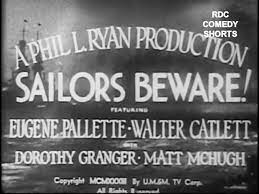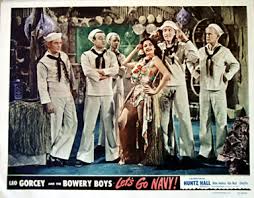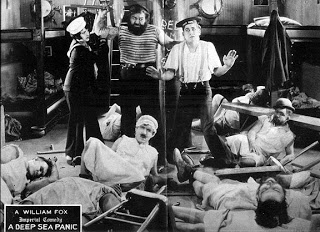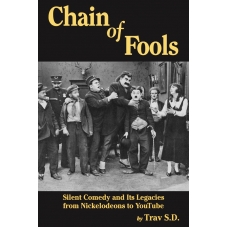It’s Fleet Week in New York as of this morning — and this reminded me that there’s many a classic comedy involving ships, sailors and sailing. And so here’s a selection. For the sake of my sanity, I’ve left pleasure cruises out of the equation, for they stray from the theme. This leaves out some mighty tempting Keaton films, but a navy is nothing without discipline. And no musicals either. That’s another blogpost.
Shanghaied (1915)
In this funny Esssanay comedy, Charlie Chaplin plays a poor shlub who loves the daughter (Edna Purviance) of a shipowner (Wesley Ruggles). He is hired to help a ship’s mate shanghai sailors for a voyage. His job is to hide in a barrel and strike his victims on the head with a mallet when the other guy entices them with the promise of a drink of liquor. After several guys are thrown on board the captain and his accomplice turn the tables on Charlie and clonk him as well. The men wake up some time later and and are put to work.
One obvious technical flaw in the film that audiences of 1915 probably didn’t mind so much: scenes that ought to be taking place out at sea are obviously shot in a busy, populated harbor, probably in a boat that’s still docked. At any rate we get to see in embryo form business that Chaplin will resurrect later, such as the “rocking boat” effect he would revive for The Immigrant. Lots of slapstick stuff follows, involving the serving and eating of dinner, and moving cargo (and, accidentally, men) with grappling hooks. The film takes a turn for the excellent when we get a plot twist: Edna has stowed away in board, dressed as a man. This puts her in danger. Her father comes to a Griffith-esque rescue in a speedboat. He is about to remove her from the clutches of Charlie when…
A Submarine Pirate (1915)
A major hit in its day and still one of the the best known comedies of its star Syd Chaplin (Charlie’s brother) who made it for Mack Sennett shortly after Charlie himself had gone over to Esssanay. It was Sennett’s biggest hot of the year. Very topical stuff in its day (the World War One era). Syd’s a waiter who overhears an inventor’s plan to use a submarine to get to an undersea treasure. He disguises himself as an admiral and worms his way into the expedition.
Luke Joins the Navy (1916)
This short dates from the time when Harold Lloyd was still performing as “Lonesome Luke”, before he began doing his more famous “glasses” character.
In the film store clerk Luke (Lloyd) is bested out of his girl (Bebe Daniels) by a sailor, who leaves an even better impression by decking a lowlife on the sidewalk as he leaves. Luke and his buddy (Snub Pollard) decide to join the navy. Some slapstick gags ensue on the deck of a navy vessel before Luke’s parents come to bail him out. Shot on a real navy ship with real sailors.

Captain Kidd’s Kids (1919)
Another Harold Lloyd comedy, this time rockin’ the glasses. Around this period, many of Lloyd’s films seem very much influenced by Douglas Fairbanks, and this one is a good example. In this one, Harold plays a young man who wakes up hungover from the wild bachelor party (his own) the night before. His butler (Snub Pollard) locates him sleeping in a bureau drawer and attempts to wake Haolrd with an alarm clock, which Harold keeps mistaking for a phone. After several more sordid mishaps, his mother-in-law-to-be (Helen Gilmore) calls off the wedding and decides to take her daughter (Bebe Daniels) on a cruise to the Canary Islands.
Harold and Snub get on the same ship. Harold falls asleep on deck and wakens to learn that the ship has been taken over by pirates. Later, an all-girl pirate ship arrives and rescues Harold and Snub only to force them to work in the galley. (Look for future Lloyd director Fred Newmeyer as the cook Ah Ling). Of course, in the end, it all proves to have been a dream — the fact that Harold went to sleep was the tip-off. That’s always the tip-off!
A Sailor Made Man (1921)
At four reels, it was Harold Lloyd’s longest comedy to date. In its day it was considered Lloyd’s first feature, nowadays many consider it his last short, though a long one. (And it was initially conceived as a short; Lloyd’s writers simply came up with too much material for two reels).
Harold plays an idle, very entitled rich boy. He seems to think he owns the world and everybody in it. For some reason we don’t hate him as we should. There’s something very innocent about him. He just doesn’t know any better. Certainly he makes people who have to deal with him angry, but the audience doesn’t dislike him. As an example of his character’s lack of boundary when we first meet his character, he seems to be painting. The camera pulls back and then we see that he is only closely studying a painters work as he paints. This is an example of how he doesn’t have any sense of boundary.
He decides he wants to marry his very popular girlfriend (Mildred Davis) and makes the mistake of announcing that he wants to do so to her father. The father is outraged and replies that he can do so once he actually has some purpose, and has done some work in the world. So Harold joins the navy. Funny—now Harold is the other Harold, the Harold we know from most of his movies. He’s lost the entitlement, he’s just a little fellow. Lots of gags aboard ship as Harold first runs afoul of his big bunkmate and his superiors. But the big guy becomes his friend when Harold takes the blame for something he himself actually did. Later it looks like Harold has knocked out the navy boxing champ, which further makes him okay in the big guy’s book.
Meanwhile Mildred and party go on a worldwide cruise on a yacht with her father. What do you want to bet they’ll wind up in the same place as Harold? They do, six months later. The fictional port they stop at looks like India or the Middle East. When Mildred is stolen by a very sinister looking Rajah or Sheik of some sort for his harem, Harold must affect a rescue in this enormous fairy tale-looking palace. Which he does. When Harold proposes to the girl ship-to-ship via semaphore flags, the father now acquiesces.
The Love Nest (1923)
Buster Keaton ‘s last silent comedy short (thereafter he moved on to features). The title of the film is misleading. The Love Nest is not a place for heavy petting, it is the name of a ship. Thus it is a precursor to The Navigator and The General in being a vehicle named after…a vehicle. I think this is breath-takingly perfect movie. Keaton’s character has been thrown over by a girl (Virginia Fox), so he sets out for adventure on a small boat. He wakes up few days later with greasepaint 5 oclock shadow and gets shanghaied by a whaling ship with a cruel captain (Joe Roberts) who throws all his sailors overboard for small infractions. Through happenstance Keaton keeps avoiding this fate. He eventually escapes by making a hole in the bottom of the ship and sitting in his dingy until it is afloat. Later, he winds up on a naval practice target. When the cannon shoots him, he flies way up into the sky and land back in his boat. But it has all been a dream. He is still moored to the dock.

The Misfit (1924)
Clyde Cook as a henpecked husband who joins the Marines to escape his shrewish wife, and ends up driving his drill sergeant crazy. In the end he manages to get both the sergeant and his wife to fall into the ocean, solving all of his problems. Directed by Albert Austin.
A Deep Sea Panic (1924)
A James Parrott short, directed by Roy Del Ruth. Parrott and pals are cooks on a ship. The boat looks like a yacht, but the crew are all roughnecks as though it were a merchant vessel. No one ever does any work. Just a bunch of galley gags at first. The captain is a really mean guy, and objects keep accidentally getting cooked and passed onto his plate…a welcome mat, a doorknob, a wallet. For some reason a girl is on board. The captain wants to impress her. Goes for a shave, but hot tar (spilled by a monkey) keeps falling on his face. Just as he is chasing the hapless hero, a navy vessel shows up. To escape the captain, the hero runs up a pirate flag. The navy vessel shoots at the ship until its quite blown up, leaving only our 3 heroes on a scrap of floating detritus.
Why Girls Love Sailors (1927)
Though this film features both Stan Laurel and Oliver Hardy in prominent parts, they are not teamed together as Laurel and Hardy, nor do they play their familiar characters. This is particularly interesting because in the film Duck Soup, released four months earlier, they had played something like a team and their characters were markedly like Stan and Ollie. But Duck Soup was kind of a fluke. For several months they went back to playing the sort of parts they had traditionally played. This is one of those anomalous films. As you will discover, this doesn’t stop unprincipled distributors from marketing it as one of their team comedies,
In Why Girls Love Sailors Laurel plays a “periwinkle fisherman”; Viola Richard plays his girl, whom he has sworn to marry. Unfortunately, a rough tough sea captain (Malcolm Waite) has plans of his own for the girl. Learning of their plans, he throws Laurel down into a fishing net, and kidnaps the girl. Laurel sneaks onto the boat with a stocking on his head, scaring a drunken watchmen who thinks he is a headless ghost. He then finds –-for some reason we won’t ponder too deeply — a trunk belonging to a female impersonator. The bulk of the rest of the movie concerns Laurel in drag, luring sailors, bonking them on the head, then posing them with their noses thumbed at first mate Oliver Hardy who gets enraged and throws them all into the sea. There is a final confrontation with the captain. To the rescue comes the captain’s furious wife (the immortal Anita Garvin) who knows of his philandering and proceeds to shoot the captain with a gun while Laurel and his girl wriggle to safety.
Hello, Sailor (1927)
A Lupino Lane and Wallace Lupino for Educational, directed by Mark Sandrich. Really just a succession of gags without much plot. Two sailors coming ashore in a small boat for shore leave. They are buddies but mildly antagonistic toward one another. Lupino lights his cigarette and accidentally sets Wallace’s hat on fire. They go to debark: Lupino does the old split with one foot on boat one foot on dock bit and falls into the water. Wallace hoists him out with hook. Lupino’s suit is shrunk. Water comes out of his ears. He puts on a spare suit, which is too big. He knocks an officer into the water.
Both sailors have notes from sweethearts they haven’t met yet. Business with duffel bags, and trouble catching trolley. Eventually they arrive at the same door—they appear to have same girlfriend! Their rivalry now heats up as they both vie for the girl’s attention, each sitting on either side of her on the sofa. They both pin medals to themselves. Wallace sings, Lupino dances a sailor’s hornpipe. Then it turns out that the girl is girlS—twin sisters. They play a trick on the guys, fickly choosing one over the other. Lupino takes a bite out of a piano stool. The two get in a shoving match, then they have an all out fight. This is the scene where Lupino does the famous run up and down the inside of an arch. Finally the guys learn the truth — the girls are twins.

Two Tars (1928)
In this hysterical short, Laurel and Hardy are two sailors on dates with a couple of girls in a rented car. The meat of the film occurs on the road to the beach where they and their dates get stuck in bumper to bumper traffic and a general fight breaks out where fender benders lead to every driver purposely destroying (tearing apart) the vehicles around him. The level of destruction is appalling. Finally a cop comes to break it all up. A long line of maimed cars files by. Laurel and Hardy make their getaway but not before destroying one last car. A truck runs over the cop’s motorcycle so he cant follow. All the cars drive into a train tunnel. Train comes. Most of the cars manage to back out, but where are Laurel and Hardy? I’ll make you watch the film for the priceless sight gag.
Men O’War (1929)
In this, one of Laurel and Hardy’s first sound shorts, the boys are a couple of sailors on shore leave, walking in a park. Some lost gloves create the opportunity for them to start up a conversation with a pair of cute girls and they go on a date to the soda fountain. (The soda jerk is played by James Finlayson in his first talkie, and boy does he ever make a lot of faces during his brief turn). The boys discover they only have 15 cents, enough for three drinks. Hardy’s solution is that Laurel should refuse a drink, but Stan keeps fouling things up, partially because he’s dumb, but also undoubtedly because he would really like a soda.
To Ollie’s shock, the tab turns out to be 30 cents, so he leaves Stan to deal with it. We fear disaster when Stan uses a nickel to play the slot machine, but he saves the day by winning. They can pay their tab, buy the girls several gifts and then take them out on the lake for a rowboat ride. Laurel rows first, botching the job so they keep going around in circles. Then Hardy gets involved and they continue going around in circles despite the fact that they try several rowing configurations. Then the boy set off a rash of capsizings and battles with seat cushions until eventually all is chaos…

Any Old Port (1932)
In this Laurel and Hardy comedy, the boys are a couple of salts just off a whaling vessel. They check into sailors’ boarding house run by a character named Mugsy one of the most hilariously heinous heavies in comedies, played by Walter Long. They gallantly rescue Mugsy’s washerwoman from a forced marriage to Mugsy, but then are stranded without a dollar (Stan left their purse in the room). To make some dough, Ollie volunteers Stan for a boxing match. The opponent turns out to be – Mugsy! But that’s okay, because Stan has accidentally put on Mugsy’s boxing glove, which has a horseshoe in it. He wins the bout, which isn’t so great after all. Ollie has bet all their money against him.
Son of a Sailor (1933)
Here, Joe E. Brown (as he often did) plays a young man living in the shadow of a more distinguished father, in this case, a swab-o. The climax (later exhumed by Laurel and Hardy for Great Guns) has the lad accidentally being used for target practice. In the end, he foils a spy ring! The comedy also features Thelma Todd.

Sailors Beware (1933)
This comedy short pairs Walter Catlett with Eugene Palette (whom you’ll recognize from many a ’30s screwball comedy). The two of them together, as sailors no less, remind me of many a Laurel and Hardy short, though their characters are very different. Also in this all-star effort, Dorothy Granger, Matt McHugh, Bobby Dunn, and a very young Walter Brennan! Directed by Del Lord.

Tars and Stripes (1935)
Buster Keaton talkie short for educational, with Vernon Dent as foil. Essentially Buster just keeps getting out of the brig and accidentally causing more havoc for the officer played by Dent. He never gets to go in to dinner. Dent keeps falling into the water. Also Keaton keeps antagonizing the guy by seeming to flirt with his girlfriend. In the end, he rescues an officer (whom he had also accidentally knocked in the water) and gets a medal. He still winds up in the brig — but this time the girl sneaks in with him.
Our Relations (1936)
While farcical this feature has one of Laurel and Hardy’s more sophisticated plots – – essentially The Comedy of Errors. In the film, the comedians each play a pair of brothers: a couple of henpecked husbands, and their twins, a pair of less domesticated, trouble-prone sailors. The domestic Laurel and Hardy are under the impression that their no-good brothers were hanged, leaving them all the more nonplussed when the brothers arrive in their town and start causing confusion. It is a most enjoyable ride. Long time Laurel and Hardy fans will appreciate the presence of Jimmy Finlayson and Daphne Pollard in the cast. Movie buffs will also recognize Alan Hale(senior) and Sidney Toler.
In the Navy (1941)
What saves this Abbot and Costello service comedy being from being a mere retread of their previous hit Buck Privates is the presence of Dick Powell, Dick Foran, and the Condos Brothers in the cast. Otherwise: it’s Buck Privates on a boat.

Let’s Go Navy (1951)
The idea of the Bowery Boys in the Navy unavoidably has me thinking of the dive bar in Last Exit to Brooklyn. How about a little realism, for chrissake? This has the usual Bowery Boys plot — the boys raise some money for a charity, then it is stolen by a couple of sailors. So naturally they enlist so they can do some sleuthing so they can retrieve the money. Ya know, like ya do. I often say this and I mean it — one of the main points of superiority of Bowery Boys vehicles like this over those of Abbot and Costello is that they only an hour long. Just when you can stand no more, it is over.

Sailor Beware (1952)
This Martin and Lewis picture is one of my brother’s favorite comedies and he will do his imitation of Jerry Lewis attempting to bale out a sinking dingy at the slightest provocation: (nasal shriek) “Get the water out of the boat! Get….get the…get the wah-ahah!” My brother is a former sailor; it must add to the appeal. The Martin and Lewis service comedies remind me so much of the Abbot and Costello service comedies in terms of plot I have a great deal of difficulty sorting them out. But that’s okay. I can live with that.
A Girl in Every Port (1952)
Groucho Marx’s last starring comedy. In the film he and The Life of Riley’s William Bendix play a couple of swabbies on shore leave who buy a racehorse, precipitating “hilarity”. At the time, Groucho was 62 years old. Ya know what? If we’re ever that hard up for ordinary seamen I’ll enlist. The love interest for both of these old salts is My Friend Irma’s Marie Wilson. This is essentially the same “three way” formula as Double Dynamite, although with lesser co-stars. After this I don’t know what the plan would have been. Perhaps Groucho with Kukla and Fran. But as we say, this was his last movie with top billing. A consolation prize was that one of the cast members of A Girl in Every Port was Dee Hartford, whose sister Eden Groucho married in 1954 (divorced 1969).
For more on silent and slapstick comedy don’t my new book: Chain of Fools: Silent Comedy and Its Legacies from Nickelodeons to Youtube, just released by Bear Manor Media, also available from amazon.com etc etc etc













